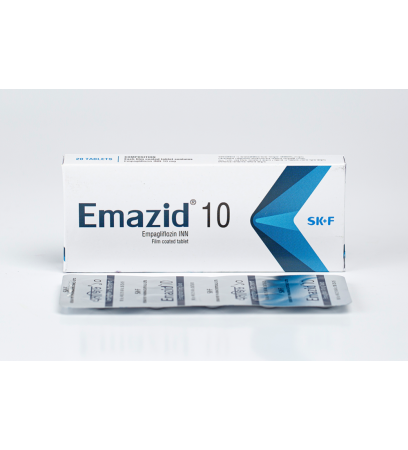Emazid Tablet 10 mg
- Brand:Eskayef Pharmaceuticals Ltd
- Product Code: Empagliflozin
- Availability: In Stock
-
25.00Tk.
This product has a minimum quantity of 10
Indications
Empagliflozin is indicated in:
- As an adjunct to diet and exercise to improve glycemic control in adults with type 2 diabetes mellitus.
- To reduce the risk of cardiovascular death in adult patients with type 2 diabetes mellitus and established cardiovascular disease.
Pharmacology
Empagliflozin is a sodium glucose co-transporter-2 (SGLT-2) inhibitor. SGLT2 co-transporters are responsible for reabsorption of glucose from the glomerular filtrate in the kidney. The glucuretic effect resulting from SGLT2 inhibition reduces renal absorption and lowers the renal threshold for glucose, resulting in increased glucose excretion. Additionally, it contributes to reduced hyperglycaemia, assists weight loss, and reduces blood pressure.
Dosage & Administration
The recommended dose of Empagliflozin is 10 mg once daily, taken in the morning, with or without food. In patients tolerating Empagliflozin, the dose may be increased to 25 mg once daily. In patients with volume depletion, correcting this condition prior to initiation of Empagliflozin is recommended.
Interaction
Diuretics: Co-administration of Empagliflozin with diuretics resulted in increased urine volume.
Insulin or Insulin Secretagogues: Co-administration of Empagliflozin with insulin or insulin secretagogues increases the risk for hypoglycemia.
Positive Urine Glucose Test: Monitoring glycemic control with urine glucose tests is not recommended in patients taking SGLT2 inhibitors as SGLT2 inhibitors increase urinary glucose excretion and will lead to positive urine glucose tests. Use alternative methods to monitor glycemic control.
Interference with 1,5-anhydroglucitol (1,5-AG) Assay: Monitoring glycemic control with 1,5-AG assay is not recommended as measurements of 1,5-AG are unreliable in assessing glycemic control in patients taking SGLT2 inhibitors. Use alternative methods to monitor glycemic control.
Insulin or Insulin Secretagogues: Co-administration of Empagliflozin with insulin or insulin secretagogues increases the risk for hypoglycemia.
Positive Urine Glucose Test: Monitoring glycemic control with urine glucose tests is not recommended in patients taking SGLT2 inhibitors as SGLT2 inhibitors increase urinary glucose excretion and will lead to positive urine glucose tests. Use alternative methods to monitor glycemic control.
Interference with 1,5-anhydroglucitol (1,5-AG) Assay: Monitoring glycemic control with 1,5-AG assay is not recommended as measurements of 1,5-AG are unreliable in assessing glycemic control in patients taking SGLT2 inhibitors. Use alternative methods to monitor glycemic control.
Contraindications
Empagliflozin is contraindicated in patients with history of serious hypersensitivity reaction to Empagliflozin or any of its ingredients, severe renal impairment, end-stage renal disease, or dialysis.
Side Effects
The most common adverse reactions associated with Empagliflozin are urinary tract infections and female genital mycotic infections. Others common side effects includes dehydration, hypotension, weakness, dizziness and increased thirstiness.
Tags: Emazid Tablet 10 mg

